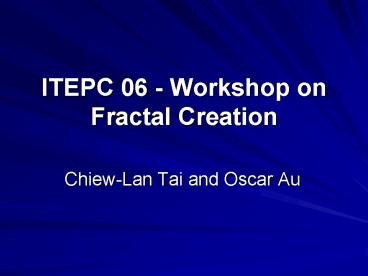ITEPC 06 Workshop on Fractal Creation - PowerPoint PPT Presentation
Title:
ITEPC 06 Workshop on Fractal Creation
Description:
To introduce simple methods of constructing fractals. To learn some related math. To appreciate the beauty of fractals. To have fun with programming. C , OpenGL ... – PowerPoint PPT presentation
Number of Views:60
Avg rating:3.0/5.0
Title: ITEPC 06 Workshop on Fractal Creation
1
ITEPC 06 - Workshop on Fractal Creation
- Chiew-Lan Tai and Oscar Au
2
Project Objectives
- Objectives
- To introduce simple methods of constructing
fractals - To learn some related math
- To appreciate the beauty of fractals
- To have fun with programming
- C, OpenGL
3
Mandelbrot Nature
- Mandelbrot, 1983 clouds are not spheres,
mountains are not cones, coastlines are not
circles, and bark is not smooth, nor does
lightning travel in a straight line - How to represent natural objects?
- Using equations? No.
- Answer fractal-geometry methods
4
Equations vs. Procedures
- Methods based on equations
- Adequate for describing manufactured objects
- For smooth surfaces and regular shapes.
5
Equations vs. Procedures
- Methods based on procedures
- Realistic representations for nature objects,
such as mountains and clouds - Objects with irregular or fragmented features
6
Fractal Gallery Classic Fractals
Sierpinski gasket reptile
Quadric Koch island
7
Fractal Gallery Classic Fractals
The Mandelbrot set
The Julia set
8
Fractal Gallery Classic Fractals
courtesy of Amazing Seattle Fractals
9
Fractal Gallery Classic Fractals
10
Fractal Gallery Natural Phenomenon Synthesis
Fractal forest (courtesy of John C. Hart, UIUC)
Fractal fern (courtesy of Paul Bourke)
11
Fractal Gallery Natural Phenomenon Synthesis
Mountain with vegetation stormy clouds
(courtesy of Jean-Francois COLONNA)
12
Fractal Gallery Natural Phenomenon Synthesis
Light clouds at sunset (courtesy of Jean-Francois
COLONNA)
13
Fractal Gallery Natural Phenomenon Synthesis
Snowy mountain (courtesy of Jean-Francois
COLONNA)
14
OpenGL ProgrammingPart I
Main reference Hill Computer Graphics uisng
OpenGL (Chapter 2)
15
What is OpenG (OGL)?
- OGL is 3D graphics modeling library
- In this project, we will only use it to draw 2D
objects.
16
What is OpenG (OGL)?
- Interactive computer graphics system that allows
us to access graphics hardware - Easy to use
- Programs run efficiently
- Hardware-independent
- Graphics API (Application Programming Interface)
- A library of functions
- Others DirectX (Microsoft), Java3D
17
What is OpenG (OGL)?
- OGL is independent of any specific window system
? basic window operations are not included - Graphics user interface programming
- GLUT OGL Utility Toolkit
- Simple but easy to use
18
Programming Environment
- OGL is usually installed on a MS Windows machine.
- Programming environment
- MS Visual Studio .Net 2003
- Libraries we will use
- OGL (basic API tool)
- GLU (OGL Utility Library)
- GLUT (OGL Utility Toolkit, a windowing toolkit
that handles window system operations)
19
OGL Data Types
- To make more portable, OGL provides internal data
types
20
Basic OGL Syntax
- Functions are prefixed with gl,
- glBegin, glClear, glClearColor
- Constants in capital letters, and the underscore
is used as a separator - GL_2D, GL_LINES, GL_TRIANGLES
- Built-in data-type names begin with GL
- GLbyte, GLshort, GLint, GLboolean
21
Skeleton of an OGL program using GLUT
int main(int argc, char argv) glutInit(argc,
argv) // initialize the toolkit glutInitDispl
ayMode(GLUT_SINGLE GLUT_RGB) // set the
display mode glutInitWindowSize(640, 480) //
set window size glutInitWindowPosition(150,
100) // set window position glutCreateWindow("
my first attempt") // open the screen
window // register the callback
functions glutDisplayFunc(myDisplay) glutReshap
eFunc(myReshape) glutMouseFunc(myMouse) glutKe
yboardFunc(myKeyboard) myInit() //
additional initializations as necessary glutMainL
oop() // go into a perpetual loop
22
Creating Window for Drawing
- The first five function calls use GLUT to open a
window for drawing
sx
(150, 100)
Coordinate system in OGL
sy
23
First OGL Program DrawDots
24
First OGL Program DrawDots
- Our first program is not interactive. It consists
of three functions main, myDisplay, myInit. (see
accompanying demo program)
int main(int argc, char argv) glutInit(argc,
argv) // initialize the toolkit glutInitDisplay
Mode(GLUT_SINGLE GLUT_RGB) // set the display
mode glutInitWindowSize(640, 480) // set window
size glutInitWindowPosition(100, 150) // set
window position glutCreateWindow("my first
attemp") // open the screen window glutDisplayFu
nc(myDisplay) // register redraw
function myInit() // additional
initializations as necessary glutMainLoop() //
go into a perpetual loop
25
First OGL Program DrawDots
- Draw primitives
- Display callback function myDisplay
void myDisplay() glClear(GL_COLOR_BUFFER_BIT)
// clear the screen glBegin(GL_POINTS) glVerte
x2i(100, 50) // draw three dots glVertex2i(100
, 130) glVertex2i(150, 130) glEnd() glFlush
() // send all output to display
26
First OGL Program DrawDots
- Draw primitives
- glBegin(GLenum mode)
- mode can be GL_POINTS, GL_LINES, GL_POLYGON, etc.
27
First OGL Program DrawDots
- Initialization
void myInit() glClearColor(1.0, 0.0, 0.0,
0.0) // set red background color glColor3f(0.0,
1.0, 0.0) // set the drawing color glPointSize(1
0.0) // a 'dot' is 10 by 10 pixels // The
following lines establish the coordinate system.
// Details will be covered later. glMatrixMode(
GL_PROJECTION) glLoadIdentity() gluOrtho2D(0,
640, 0, 480)
28
First OGL Program DrawDots
- OpenGL is a state machine
- It keeps track of many state variables
- Current size of a point, current color of
drawing, current background color, etc. - Color of drawing is specified using
glColor3f(red, green, blue) (range 0, 1) - Background color is set with glClearColor(red,
green, blue, alpha). glClear clears the entire
window to the background color (cf. myDisplay). - The value of a state variable remains active
until a new value is given.
29
Line Drawing
glLineWidth(2.0) // set line
thickness glBegin(GL_LINES) glVertex2i(10,
20) // first horizontal line glVertex2i(40,
20) glVertex2i(20, 10) // first vertical
line glVertex2i(20, 40) // four more calls to
glVertex here for the other two lines glEnd()
30
Drawing Modes
- glBegin(GLenum mode)
31
Recommended Resources
- OpenGL official Website
- OpenGL Utility Toolkit (GLUT) (download GLUT)
- Nice GLUT Tutorial
- NEHE OpenGL tutorial
- OpenGL red book































